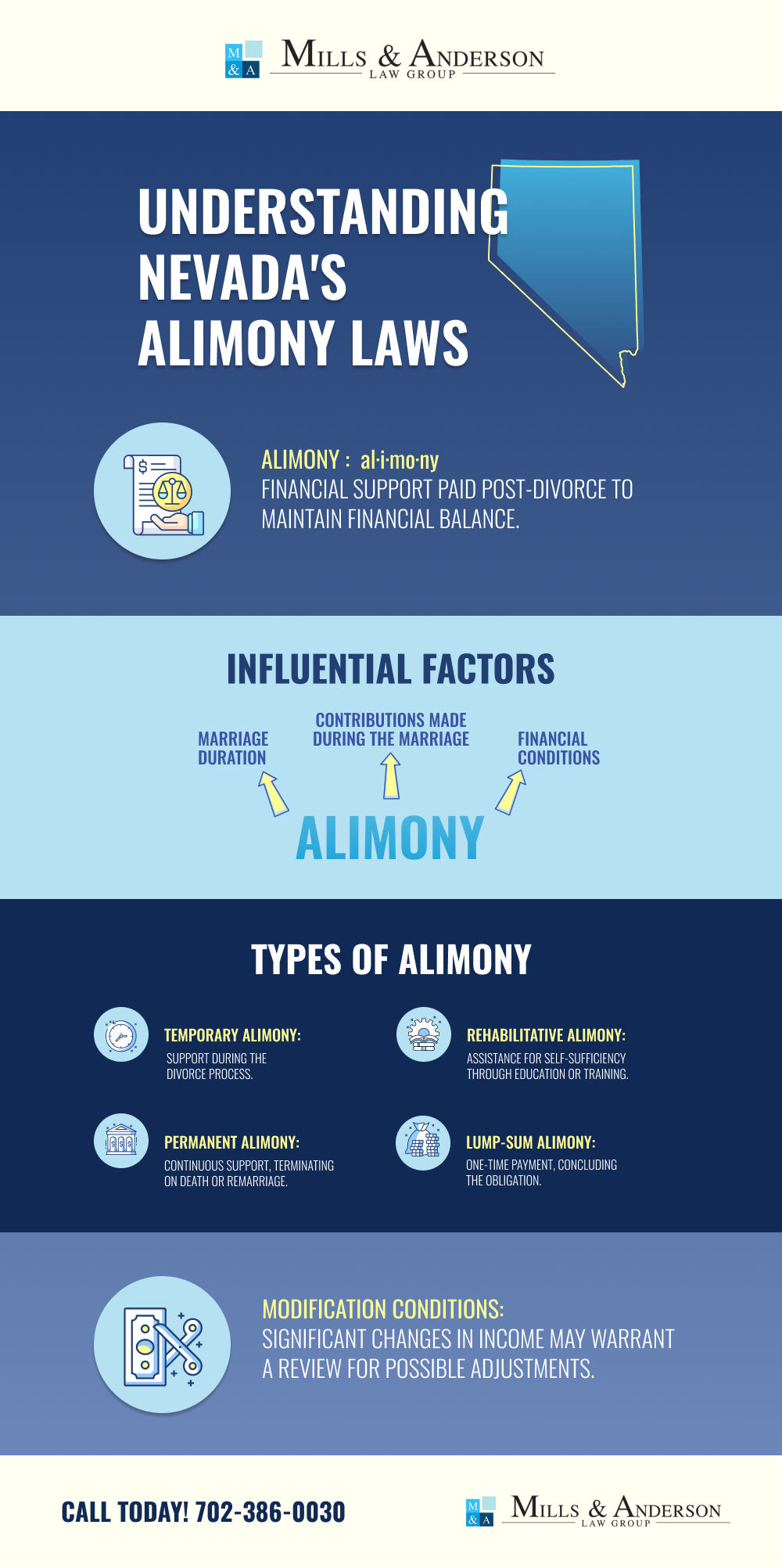How Does the Court Determine Alimony Obligations in Nevada

Defining Alimony
Nevada statutes do not specifically define alimony. But generally speaking, alimony is an award of financial support paid from one spouse to the other for a specified period of time, or in a lump sum, after a divorce. Alimony, also called spousal support in Nevada, is not an entitlement of either spouse. This means that it is in the court’s discretion to grant or deny alimony. The court’s determination on alimony is separate from the division of any property. However, the two are closely related, and a judge’s basis for alimony decisions takes property into account.
Determining Alimony Obligations
In certain circumstances, it may be readily apparent which spouse is likely to receive an award of alimony because of income disparities. However, it is not always clear which spouse will pay alimony because there is no formula for calculating alimony obligations in Nevada. The court must weigh several factors when determining the appropriate award and the appropriate recipient.
Need and Ability to Pay
Before awarding alimony to a spouse, the court has to consider whether the requesting spouse needs financial assistance. Even if the requesting spouse needs financial assistance, the court must determine whether the other spouse has the ability to financially support their ex-spouse. Nevada law provides that the court shall also consider other factors such as:
- The financial condition of each spouse;
- The nature and value of the respective property of each spouse;
- The contribution of each spouse to any property held by the spouses;
- The duration of the marriage;
- The income, earning capacity, age, and health of each spouse;
- The standard of living during the marriage;
- The career before the marriage of the proposed alimony recipient;
- The existence of specialized education or training or the level of marketable skills attained by each spouse during the marriage;
- The contribution of either spouse as a homemaker;
- The award of property granted by the court in the divorce, other than child support and alimony, to the proposed alimony recipient; and
- The physical and mental condition of each party as it relates to the financial condition, health, and ability to work.
Once the court assesses these factors, the appropriate alimony amount and type should be apparent.
Types of Alimony
The court can grant different types of spousal support. Ideally, the court tailors an alimony award to serve the needs of the proposed alimony recipient. Let’s look at the different types of alimony.
Temporary Alimony
The court awards temporary alimony after separation and throughout the divorce process until a final order is issued. This type of spousal support is ideal for the recipient’s short-term maintenance. Nevada law does not provide for a specific situation or circumstance warranting temporary alimony. Instead, the judge has the discretion to look at the factors and grant temporary alimony as needed.
Permanent Alimony
Permanent spousal support is financial support paid from one spouse to the other for a specified period of time following a divorce. However, despite the name, permanent alimony does not go on in perpetuity. Nevada law provides that payments for permanent alimony terminate upon the death of the obligate party or remarriage of the recipient—unless otherwise specified by the court.
Rehabilitative Alimony
Some spouses need alimony so that they may become fully self-supporting in the future. That is where rehabilitative alimony comes in. When granting a divorce, the court should consider the need to grant alimony for the purpose of a spouse obtaining training or education relating to a job, career, or profession. The court must consider these additional factors when deciding whether rehabilitative alimony should be granted:
- Whether the spouse who would pay rehabilitative alimony has obtained greater job skills or education during the marriage; and
- Whether the spouse who would receive rehabilitative alimony provided financial support while the other spouse obtained job skills or education.
The court must then specifically state when the recipient of alimony must begin the training or education relating to a job, career, or profession.
Lump-Sum Alimony
Lump-sum alimony is a one-time amount of money paid to a spouse upon entry of the divorce decree. Once provided, this award permanently ends the obligation of one spouse to support the other. This type of award is usually attractive to a spouse that may want to purchase another home once the divorce is finalized. It may also relieve the obligated spouse of the constant worry of keeping up with monthly spousal support payments.
Modifying Alimony
Eventually, modification of an award of spousal support may become necessary. Nevada law provides that the party paying spousal support may file a motion to modify the award if circumstances have significantly changed. The court considers a change of 20% or more in the obligated spouse’s gross monthly income to be significant enough to require a review and possible modification. For purposes of modification, “gross monthly income” means the total amount of income received each month from any source of a person who is not self-employed. If the obligated party is self-employed, “gross monthly income” is the gross income from any source after deduction of all legitimate business expenses, but without deduction for personal income taxes, contributions for retirement benefits, contributions to a pension, or for any other personal expenses.
Experienced Attorneys Are Ready to Assist You
At Mills & Anderson, our team of highly experienced Clark county family law attorneys is here to assist you. We understand that going through a divorce is a huge stressor, and we will handle the legal details so you can better adjust to your new normal. Our lawyers have decades of combined experience in family law. We have worked in child custody, child support, grandparent rights, guardianships, termination of parental rights, adoptions, and more. This spectrum gives us a well-rounded understanding of our clients’ cases. Contact our team today so that you can have access to some of the best family lawyers in Nevada.


